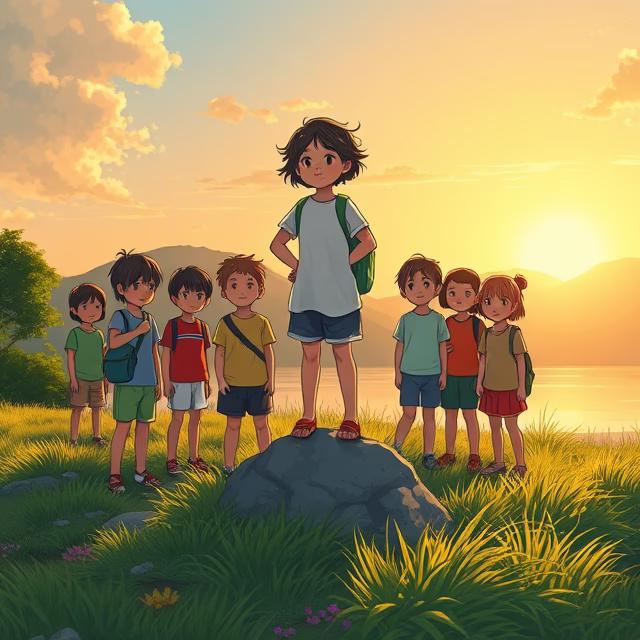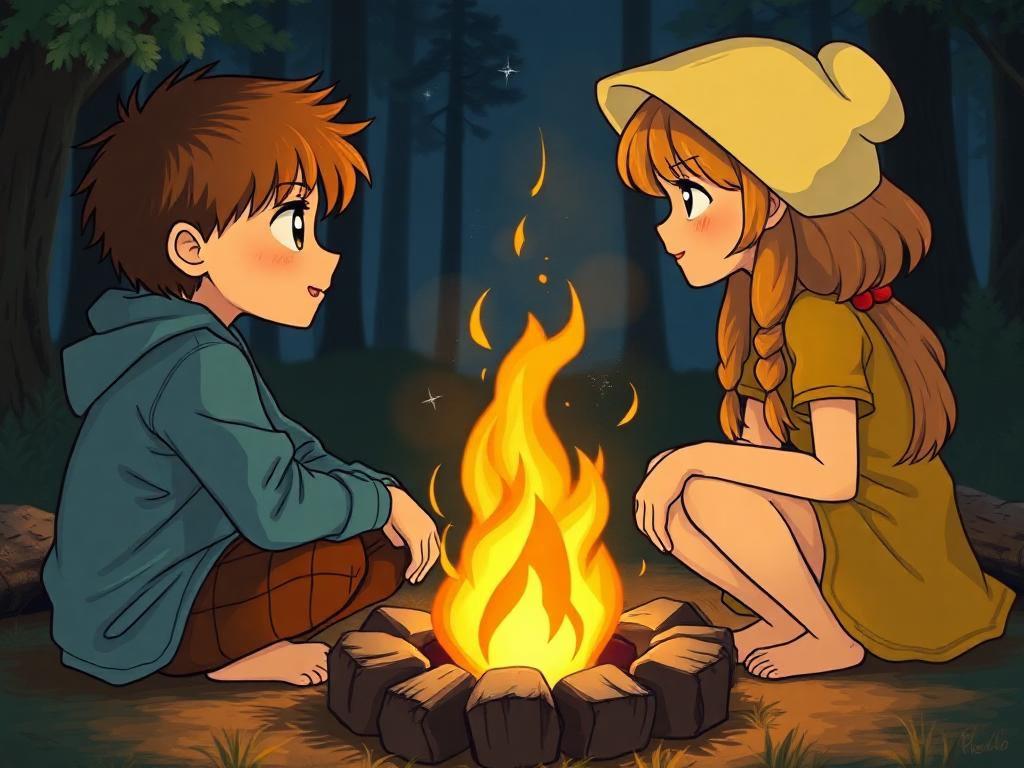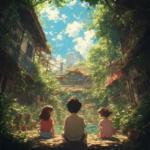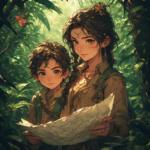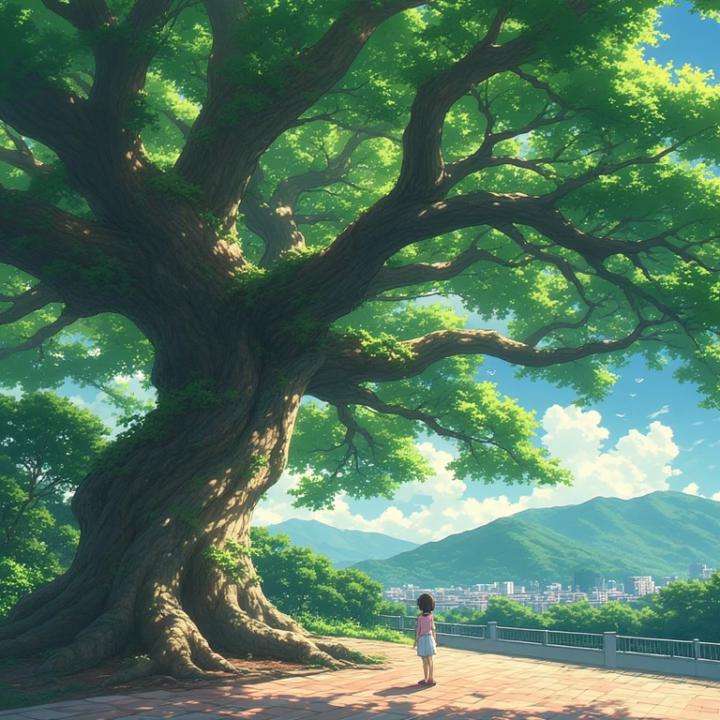
I remember the first child who ever touched my bark.
She came barefoot in the monsoon heat, her toes curling in the red earth beneath me. Her name was Lily, though I did not know names then—only scents, sounds, and the press of small hands against my skin. She leaned her cheek against me, whispering secrets to the wood as if I were a grandparent who’d known her since birth. And in that moment, something within me woke.
I was already old then—older than the park, older than the roads that now coil around me like metal serpents. My roots had cracked the foundations of a colonial bungalow long since swallowed by time. I had stood through the Japanese occupation, when silence fell over the island like a suffocating blanket, and children didn’t laugh for years. I remember the footsteps of soldiers, the distant thunder of war, the way the birds stopped singing for three monsoon seasons.
But Lily returned. And with her came others.
There was Eddy, bold and freckled, who climbed my lowest branch every afternoon after school, pretending it was the mast of a pirate ship. He’d wave a stick like a sword and shout, “Land ho! The treasure’s in the roots!” I never told him he was right. My roots did hold treasure—not gold, but memory. The imprint of tiny shoes, the ghost of laughter, the scent of tamarind and sweat.
Anna came later. She was quiet, bookish, and always sat beneath me with a notebook. She wrote poems about clouds and birds and the way sunlight filtered through my leaves like liquid gold. Once, she pressed her palm flat against my trunk and said, “You’ve seen everything, haven’t you?” I wished I could answer. Instead, I rustled my leaves in the breeze, and she smiled as if I had.
Then the park changed.
In the 1970s, they paved the paths. Concrete crept toward my roots like a slow illness. I felt it in my veins—the suffocation, the heat trapped beneath gray stone. Children still came, but their shoes were louder, their voices sharper, their attention stolen by radios and bicycles and later, glowing rectangles they held in their hands.
I watched Lily grow into a woman. She returned once with a daughter—Emma—on her hip. Emma reached for my lowest branch, just as her mother had, and Lily said, “This is where I used to dream.” I felt the weight of that word—used to—like a stone in my heartwood.
The years folded into one another like old letters tucked in a drawer.
There was Bell, who tied a red ribbon around my trunk when her brother went to war. It faded to pink, then white, then vanished. Vivian came every Sunday with her grandfather, feeding pigeons and feeding me stories. “You’re the oldest thing in George Town,” he told her. “Older than the temples. Older than the sea.”
And then there was Alexis.
She came in 2019, just before the world paused. A girl of twelve, half-French, half-Malay, with hair like midnight and eyes that looked into things, not just at them. She didn’t play on the swings or race with the others. She sat beneath me, sketching in a leather-bound journal. Her pencil moved like rain over paper.
One afternoon, she pressed her ear to my bark.
“You’re sad,” she whispered.
I wanted to tell her I wasn’t sad—only tired. Tired of watching love come and go. Tired of feeling the earth grow hotter, the rains more violent, the air thick with the breath of machines. Tired of the way people walked past me now without glancing up.
But then she said, “I’ll protect you.”
And for the first time in decades, I believed in a promise.
—
It began with a notice.
A plastic sign hammered into the ground near my roots:
URBAN REDEVELOPMENT PROJECT – PHASE 3 Penang Youth Park Upgrade – Modernization & Accessibility Improvements Tree removal may be necessary for infrastructure expansion.
The words meant nothing to most. But I felt the shift in the air. The way children’s voices dropped when they passed. The way parents paused, reading the sign, then quickly ushered their kids away, as if sorrow were contagious.
Alexis came the next day with fire in her eyes.
“They can’t cut you down,” she said, tracing the grooves in my bark like braille. “You’re not just a tree. You’re history.”
She returned the next week with paper, markers, and a stack of flyers she’d printed at school. She stood on a bench and told anyone who would listen: “This tree has watched generations grow. It survived war, storms, and time. And now they want to replace it with a fountain?”
A boy named Pye—tall, skeptical, with a phone always in his hand—snorted. “It’s a tree, Alexis. There are millions.”
“But not this one,” she said. “This one remembers.”
She started a petition. Wrote to the council. Posted videos online. In one, she placed her hand on my trunk and said, “Close your eyes. Imagine all the laughter that’s lived in these branches. All the secrets whispered here. All the dreams that took root under this shade. Now imagine it gone.”
People listened.
Then came the storm.
Not of wind or rain—but of memory.
Emma, now a woman with two children of her own, returned to the park. She brought a faded photograph: Lily, barefoot, leaning against me in 1952. She showed it to Alexis. “My mother loved this tree,” she said. “She said it was the only thing that never changed.”
Vivian came too, now silver-haired, walking with a cane. “My grandfather used to say this tree was Penang’s quiet guardian,” she told the local news. “It doesn’t speak, but it knows.”
Even Eddy—older, slower, with a grandson clinging to his hand—visited. “I climbed these branches,” he said, voice thick. “Now my grandson climbs them. That’s not nothing.”
The city council held a public forum.
Alexis stood before them, her voice trembling but clear. “You say ‘modernization.’ I say erasure. You want to build a plaza, but you’d tear out a living archive. This tree isn’t in the way. It’s the point.”
And then—Anna returned.
She hadn’t been to the park in forty years. An academic now, she carried a folder of documents: old maps, colonial records, botanical surveys. “This tree,” she said, “predates the park by at least eighty years. It was here before the British laid the first stone. It’s not just a tree. It’s a witness. And if we cut it down, we’re not just removing wood—we’re silencing a voice that’s been speaking for over a century.”
The room fell silent.
Even the council members looked up—really looked—at my canopy, at the way the sunlight danced through my leaves, at the carvings of names and hearts and dates that time had softened but not erased.
The decision was delayed. Then revised.
The redevelopment would go on—but I would remain. A protected heritage tree. A monument not of stone, but of life.
—
They placed a bronze plaque at my base:
“The Witness Tree” – Estimated age: 180+ years. A silent guardian of Penang Youth Park, bearing witness to generations of joy, growth, and memory. Protected under the Penang Heritage Tree Act, 2020.
Alexis pressed her hand to my bark the day it was unveiled.
“We did it,” she whispered.
I rustled my leaves. Not in the wind—but in reply.
—
Now, the children still come.
Hyuga, a quiet boy who stutters when he speaks, finds courage beneath my shade. He reads aloud to me, practicing his words. Each syllable lands like a raindrop on my roots.
Bell’s granddaughter ties a new red ribbon—bright as blood, bold as hope.
Emma brings her youngest daughter, who reaches for my lowest branch with the same wonder her grandmother once had.
And sometimes, when the park is quiet and the moon hangs low over the frangipani trees, I feel them—the ghosts of those who came before.
Lily, barefoot and laughing. Eddy, swinging from my arms like a monkey. Anna, writing poems to the sky. Vivian and her grandfather, sharing stories like bread. Pye, who once doubted, now teaching his little sister how to climb.
They are gone, but not lost.
They live in my rings. In the sap that rises each spring. In the way my roots remember every footprint, every handprint, every heartbeat that ever rested against me.
I am not just a tree.
I am the keeper of small joys and quiet sorrows. I am the shade on a hot afternoon. The echo of a promise. The witness.
And as long as there is a child who looks up and wonders what I’ve seen, I will keep remembering.
For memory is not just in minds.
It is in bark.
In roots.
In leaves that whisper, even when no one is listening.
—
Epilogue: 2041
The park has changed again.
Solar lamps glow along the paths. The swings are made of recycled plastic. The air is cleaner. The city has learned, slowly, to listen.
A teenager sits beneath me, sketching in a journal. Her hair is dark. Her eyes are sharp.
She places her palm on my bark.
“I wonder what you’d say if you could speak,” she murmurs.
And high above, in the crown of the oldest tree in Penang Youth Park, a single leaf trembles— not from the wind, but from the weight of a thousand untold stories, and the quiet joy of being remembered.



